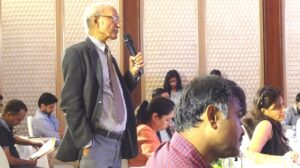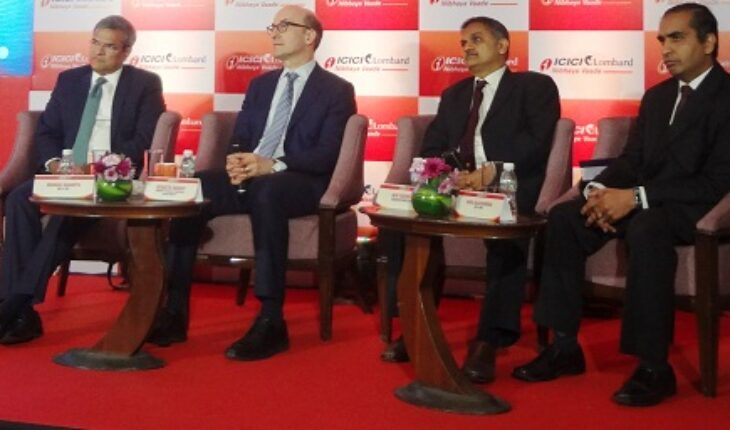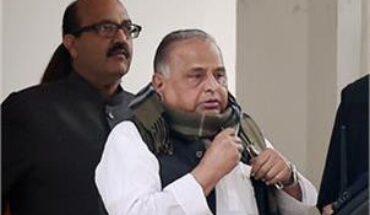New Age risks including cybercrimes are providing unprecedented challenges for the industry at large while demanding necessary tools for trapping and preventing them in the present day scenario, according to a PAN India survey titled ‘Managing New Age Risks’– commissioned by insurance company ICICI Lombard – that assessed the preparedness of Indian organizations towards new age risks. Feedback from CXOs from 100 companies across various sectors was taken for this research.
 India Inc. is witnessing unprecedented times as technology becomes a part of life for all companies – irrespective of the sector one operates in. With new technology such as Artificial Intelligence, Robotics, Cloud Computing, Blockchain, Internet of Things (IoT) come the associated risks such as cyber-attacks, data theft, cloud hacks etc. India was the target of 17 per cent cyberattacks, second only to US (38 per cent) between 2015 – 2017 as per a report by Symantec Corp, USA.
India Inc. is witnessing unprecedented times as technology becomes a part of life for all companies – irrespective of the sector one operates in. With new technology such as Artificial Intelligence, Robotics, Cloud Computing, Blockchain, Internet of Things (IoT) come the associated risks such as cyber-attacks, data theft, cloud hacks etc. India was the target of 17 per cent cyberattacks, second only to US (38 per cent) between 2015 – 2017 as per a report by Symantec Corp, USA.
The survey delved into understanding the risks that India Inc. perceives as critical for business, the importance of new age risks in their operations and the preparedness & ability of companies to handle new age risks. It also looked at the role of insurers in managing risks from the lens of Indian firms.
The research findings were unveiled by Bhargav Dasgupta, MD & CEO, ICICI Lombard, Alok Agarwal, Executive Director, ICICI Lombard and Gopal Balachandran, CFO & CRO, ICICI Lombard in the presence of Prof. Kenneth Rogoff, Professor of Economics & Public Policy at Harvard University and a former Chief Economist at International Monetary Fund (IMF).
The report highlights that companies still consider traditional risks as extremely crucial for their businesses. 58 per cent of the respondents thought that property and assets was the most pivotal risk followed by employee health and accident (53 per cent). Machinery and equipment closely followed at 52 per cent. When asked on which risks have been gaining importance in the last 3 years, the response was clearly for new age risks such as cyber-crimes, data theft etc. 67 per cent of India Inc. today feels that risks from cyber-crimes have increased substantially in the last 3 years and 63 per cent believe risks from data thefts have gone up substantially in the same period.
In terms of the challenges to handle risks, 43 per cent company executives mentioned each new age risk incident to be unique, while 42 per cent found it difficult to even identify the source of the new age risk incident, making managing it a tough task. 21 per cent firms believed that new age risk incidents spread too fast, making it difficult for firms to handle them.
Lack of internal capabilities was a key takeaway when it came to preparedness of organizations in managing new age risks. 41 per cent respondents believed that their existing systems were not equipped to handle these risks, while 39 per cent companies felt there was a shortage of skilled manpower that could address these risks.
When asked about the best way to handle new age risks, 71 per cent companies had a unanimous response that new age risks would rather be prevented, instead of being handled when they occur. On the role of insurers, 81 per cent companies believe that insurers are equipped to a certain extent in managing new age risks. Specifically, companies believe that insurers are more equipped to manage risks such as cloud computing (100 per cent) and cyber-attacks (69 per cent). However, when it comes to data theft related risks, 63 per cent firms believe that the same can be managed internally.
Professor Kenneth Rogoff, Professor of Economics & Public Policy at Harvard University and a former Chief Economist at International Monetary Fund (IMF), said today companies are being ‘bombarded’ by cyber-criminals from Russia, China, Korea and this scenario described to him at a related event sounded so scary to him that he felt like “hiding under his bed for a week.”
“Vulnerability in legacies is what big players have and even the USA is still using computer systems that date back to 1972 – which are difficult to update and still continue in use. In many ways India is more advanced than us and in the financial world, everybody is working on blockchain,” he said while noting that even 15-year-olds are committing cybercrimes these days and that the Trump Administration crisis is the biggest one that the USA has ever had to face so far.
Emphasizing that new age risks are morphing and evolving daily, Bhargav Dasgupta, MD & CEO, ICICI Lombard, said that they are already a critical reality in India and globally with need for Indian firms to take cognizance of this aspect by being prepared and having the right risk management framework in place.
“Industrial 4.0 is creating a new sense of risks that society has not figured out and it is up to society at large to decide whose responsibility it is. Cyber risk is the latest generation risk and certain clusters of risks are being identified globally. Cyber claims started with data tjeft (through malware) and now Ransomware through which the affected computer crashes totally and can be freed only when the ransom is paid off,” he said while stating that in one case in India, ransom had been asked for in ‘Bitcoins.’
Describing new age risks like heart diseases where “Prevention is better than Cure,” Alok Agarwal, Executive Director, ICICI Lombard, said risk management has taken greater centrestage over the past few years and highlighted the need for a holistic approach — even though there is a ‘dearth’ of risk management experts in India. “while the insurers are moderately equipped to deal with the new age risks, they should bring to the table the expertise to deal with this risk as every incidence is unique and the source is difficult to trace,” he said.






